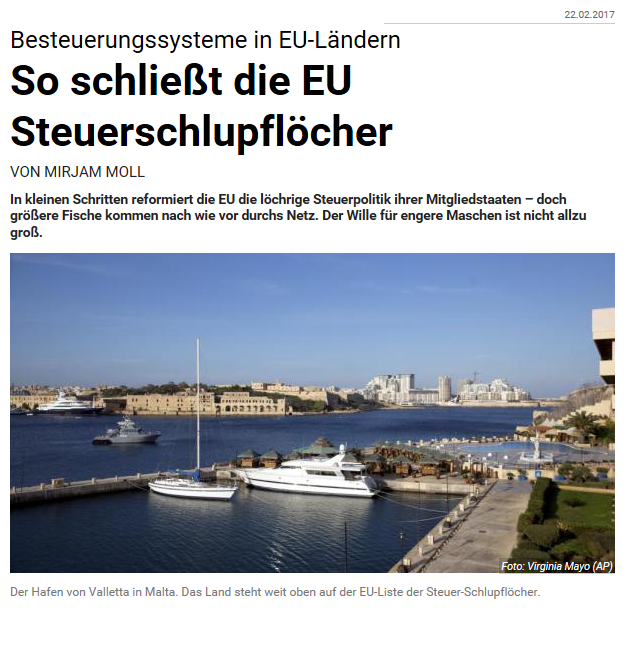Frankfurter Neue Presse: Malta’s tax haven status
The Frankfurter Neue Presse published an article a few days ago about taxation systems in EU member states. You’ll find it reproduced here in translation.
———
TAXATION SYSTEM IN EU COUNTRIES/THIS IS HOW THE EU CLOSES TAX LOOPHOLES
22.02.2017
By MIRJAM MOLL
Photo caption: The port of Valletta in Malta. The country is high on top of the EU list of tax havens.
Step by step, the EU is reforming the porous tax policies of its Member States – but larger fish are still slipping through the net. The desire for a tighter mesh is not too great.
Malta’s Finance Minister Edward Scicluna – of all people – boasted after a meeting with his colleagues in Brussels: “The EU is at the forefront in the fight against tax evasion.” The fact that he of all people seeks to take the credit for this success did not chime with the fact of the delegation which headed to his home country last Monday. This was the fact-finding (PANA) committee set up following the revelations of the so-called Panama Papers. They met in Valletta with Malta government representatives, tax administrators, non-governmental organisations, stakeholders and law firms.
The scandal was about large-scale tax avoidance practices with the help of letterbox companies in Panama, and it has put several high-ranking representatives of Malta in a bad light. Several politicians and 45 agents based in Malta had direct connections to Mossack Fonseca, the law firm in Panama, which had set up and managed operations for many European firms.
Tax haven: Madeira
Malta was already the subject of a study commissioned by the Greens in the European Parliament, which focused on the extremely favourable (corporate) tax rates applicable there. Officially, the island state levies 35 per cent on companies. But in reality, the law allows (foreign-owned) corporations to push their excise tax down to five per cent. In Europe, only Madeira, the Portuguese enclave, undercuts Malta, as investigations by the Bayerischen Rundfunk have revealed in recent days. There, the tax rate may in some cases even fall to 2.5 per cent.
Markus Ferber, a Member of Parliament for the CSU, has asked European Commissioner Pierre Moscovici, who is responsible for tax questions, why Madeira should be allowed to maintain its “questionable regime”. Moscovici replied that the current rules are compliant with EU law – more precisely with a group founded in 1999 among the member states, which seek to establish rules under a common code of conduct. The European Commission had once investigated the situation in Madeira, but the investigation was suspended when Lisbon agreed to make the necessary changes.
Still, Scicluna was content to praise himself – for Europe’s finance ministers had closed yet another loophole for companies, which in ‘official speak’ is often described as a “hybrid arrangement” of tax payments. Hidden behind this opaque concept lies the widespread practice by which multinational corporations take advantage of the differences between the tax systems of member states in such a way that they ultimately have to pay little or no tax at all. But with the new arrangement reached yesterday, which will come into force in 2020, these circumvention tactics can no longer be used when third-country states are involved.
This is an important step. But the really big issue on the agenda was a different one. Months ago, the European Commission had made a proposal for a blacklist of tax havens outside the EU. Because tax havens like the Bahamas or Panama did not appear at all, the European Parliament rejected the paper. The finance ministers decided yesterday to submit a new list by the end of the year.

